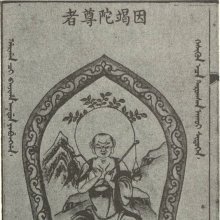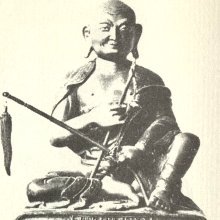Angaja, Aṅgajā, Anga-ja, Amgaja: 16 definitions
Introduction:
Angaja means something in Hinduism, Sanskrit, Jainism, Prakrit, the history of ancient India, Marathi. If you want to know the exact meaning, history, etymology or English translation of this term then check out the descriptions on this page. Add your comment or reference to a book if you want to contribute to this summary article.
Images (photo gallery)
In Hinduism
Purana and Itihasa (epic history)
Source: archive.org: Shiva Purana - English TranslationAṅgaja (अङ्गज) refers to the “body born of one’s limbs”, according to the Śivapurāṇa 2.2.29. Accordingly as Brahmā narrated to Nārada:—“[...] Then inciting the fury of Dakṣa further, she said to Viṣṇu and all other Devas and sages unhesitatingly.. Satī said:—‘[...] This body born of your limbs (aṅgaja) I shall cast off as a corpse. It is worthy of contempt. I shall abandon it and gain happiness’”.
Source: Cologne Digital Sanskrit Dictionaries: The Purana IndexAṅgajā (अङ्गजा).—A daughter of Brahmā.*
- * Matsya-purāṇa 3. 12.

The Purana (पुराण, purāṇas) refers to Sanskrit literature preserving ancient India’s vast cultural history, including historical legends, religious ceremonies, various arts and sciences. The eighteen mahapuranas total over 400,000 shlokas (metrical couplets) and date to at least several centuries BCE.
Vastushastra (architecture)
Source: Brill: Śaivism and the Tantric Traditions (architecture)Aṅgaja (अङ्गज) refers to “(an extraneous thing) related to the part ”, according to the Devyāmata (in the section śalyoddhāra-paṭala or “excavation of extraneous substances”).—Accordingly, “[...] If [someone] scratches a part of his body, [the officiant] should prognosticate an extraneous thing related to the part (aṅgaja—aṅgajaṃ śalyam) at a depth up to the part. [The officiant] should remove the extraneous thing carefully. If [someone] scratches his shoulder (?), [the officiant] should prognosticate an extraneous thing related to the shoulder (?), which is at a depth up to the [shoulder (?)]. If he knows it correctly, he should remove it. [...]”.

Vastushastra (वास्तुशास्त्र, vāstuśāstra) refers to the ancient Indian science (shastra) of architecture (vastu), dealing with topics such architecture, sculpture, town-building, fort building and various other constructions. Vastu also deals with the philosophy of the architectural relation with the cosmic universe.
In Jainism
General definition (in Jainism)
Source: The University of Sydney: A study of the Twelve ReflectionsAṅgajā (अङ्गजा) refers to the “daughter”, according to the 11th century Jñānārṇava, a treatise on Jain Yoga in roughly 2200 Sanskrit verses composed by Śubhacandra.—Accordingly, “Here [in the cycle of rebirth] a king becomes an insect and an insect becomes the chief of the gods. An embodied soul might wander about, tricked by [their] karma without being able to help it. For corporeal [souls] the mother becomes the daughter [com.—aṅgajā] , the sister, even the wife. The father, moreover, becomes the son and he obtains the paternal home”.
Synonyms: Putrī.

Jainism is an Indian religion of Dharma whose doctrine revolves around harmlessness (ahimsa) towards every living being. The two major branches (Digambara and Svetambara) of Jainism stimulate self-control (or, shramana, ‘self-reliance’) and spiritual development through a path of peace for the soul to progess to the ultimate goal.
India history and geography
Source: Cologne Digital Sanskrit Dictionaries: Indian Epigraphical GlossaryAṅgaja.—(EI 16), same as the god Kāma. Note: aṅgaja is defined in the “Indian epigraphical glossary” as it can be found on ancient inscriptions commonly written in Sanskrit, Prakrit or Dravidian languages.

The history of India traces the identification of countries, villages, towns and other regions of India, as well as mythology, zoology, royal dynasties, rulers, tribes, local festivities and traditions and regional languages. Ancient India enjoyed religious freedom and encourages the path of Dharma, a concept common to Buddhism, Hinduism, and Jainism.
Languages of India and abroad
Marathi-English dictionary
Source: DDSA: The Molesworth Marathi and English Dictionaryaṅgaja (अंगज).—a m (S jā a f) Produced from one's body; one's son, one's daughter.
Source: DDSA: The Aryabhusan school dictionary, Marathi-Englishaṅgaja (अंगज).—a m One's son. aṅgajā a f One's daughter.
Marathi is an Indo-European language having over 70 million native speakers people in (predominantly) Maharashtra India. Marathi, like many other Indo-Aryan languages, evolved from early forms of Prakrit, which itself is a subset of Sanskrit, one of the most ancient languages of the world.
Sanskrit dictionary
Source: DDSA: The practical Sanskrit-English dictionaryAṅgaja (अङ्गज).—a. [aṅgāt jāyate jan-ḍa]
1) produced from or on the body, being in or on the body, bodily; °जं रजः, °जाः अलङ्काराः (jaṃ rajaḥ, °jāḥ alaṅkārāḥ) &c.
2) produced by a supplementary rite.
3) beautiful, ornamental.
-jaḥ
Aṅgaja is a Sanskrit compound consisting of the terms aṅga and ja (ज). See also (synonyms): aṅgajāta.
Source: Cologne Digital Sanskrit Dictionaries: Shabda-Sagara Sanskrit-English DictionaryAṅgaja (अङ्गज).—mfn.
(-jaḥ-jā-jaṃ) 1. Produced or born of the body. n.
(-jaṃ) 1. Blood. 2. Love. desire. 3. The hair of the head. 4. Sickness, disease. 5. A son f.
(-jā) A daughter. E. aṅga the body, and ja what is born also similar compounds, as aṅgajāta, aṅgajanma, &c.
Source: Cologne Digital Sanskrit Dictionaries: Benfey Sanskrit-English DictionaryAṅgaja (अङ्गज).—[aṅga-ja], adj. Produced from the body, bodily.
Source: Cologne Digital Sanskrit Dictionaries: Monier-Williams Sanskrit-English Dictionary1) Aṅgaja (अङ्गज):—[=aṅga-ja] [from aṅga] mfn. produced from or on the body, ornamental, [cf. Lexicographers, esp. such as amarasiṃha, halāyudha, hemacandra, etc.]
2) [v.s. ...] produced by a supplementary ceremony
3) [v.s. ...] m. a son, [cf. Lexicographers, esp. such as amarasiṃha, halāyudha, hemacandra, etc.]
4) [v.s. ...] hair of the head, [cf. Lexicographers, esp. such as amarasiṃha, halāyudha, hemacandra, etc.]
5) [v.s. ...] the god of love, [cf. Lexicographers, esp. such as amarasiṃha, halāyudha, hemacandra, etc.]
6) [v.s. ...] intoxicating passion, [cf. Lexicographers, esp. such as amarasiṃha, halāyudha, hemacandra, etc.]
7) [v.s. ...] drunkenness, [cf. Lexicographers, esp. such as amarasiṃha, halāyudha, hemacandra, etc.]
8) [v.s. ...] a disease, [cf. Lexicographers, esp. such as amarasiṃha, halāyudha, hemacandra, etc.]
9) Aṅgajā (अङ्गजा):—[=aṅga-jā] [from aṅga-ja > aṅga] f. a daughter
10) Aṅgaja (अङ्गज):—[=aṅga-ja] [from aṅga] n. blood.
Source: Cologne Digital Sanskrit Dictionaries: Goldstücker Sanskrit-English DictionaryAṅgaja (अङ्गज):—[tatpurusha compound] I. m. f. n.
(-jaḥ-jā-jam) 1) Produced or born of the body.
2) Produced by a secondary act (as in sacrifices). Ii. m.
(-jaḥ) 1) A son.
2) The hair of the head.
3) Love.
4) A name of the god of Love.
5) Passion, desire.
6) Sickness, disease. Iii. f.
(-jā) A daughter. Iv. n.
(-jam) Blood. E. aṅga and ja.
Source: Cologne Digital Sanskrit Dictionaries: Yates Sanskrit-English DictionaryAṅgaja (अङ्गज):—[aṅga-ja] (jaṃ) 1. n. Blood; hair; love; (jā) 1. f. A daughter; a. of the body.
[Sanskrit to German]
Sanskrit, also spelled संस्कृतम् (saṃskṛtam), is an ancient language of India commonly seen as the grandmother of the Indo-European language family (even English!). Closely allied with Prakrit and Pali, Sanskrit is more exhaustive in both grammar and terms and has the most extensive collection of literature in the world, greatly surpassing its sister-languages Greek and Latin.
Kannada-English dictionary
Source: Alar: Kannada-English corpusAṃgaja (ಅಂಗಜ):—[adjective] produced from or on the body;
--- OR ---
Aṃgaja (ಅಂಗಜ):—
1) [noun] that which is produced from or on the body.
2) [noun] the hair grown on the body.
3) [noun] a male offspring; a son.
4) [noun] the Hindu god of love; Manmata.
5) [noun] love; affection.
6) [noun] any disease of the body (not including mental affliction).
7) [noun] the red liquid in the body that supplies oxygen; blood.
8) [noun] the liquid that carries spermatozoa; the semen.
9) [noun] water.
10) [noun] any of the five sensual organs;
Kannada is a Dravidian language (as opposed to the Indo-European language family) mainly spoken in the southwestern region of India.
See also (Relevant definitions)
Starts with: Amgajahava, Amgajala, Amgajanma, Amgajaraga, Amgajari, Amgajarupu, Amgajava, Amgajavige, Angajada, Angajanus, Angajata.
Ends with: Abhramatangaja, Achyutangaja, Acyutangaja, Bangaja, Dhumajangaja, Dhumamangaja, Drupadangaja, Dushtamatangaja, Gangaja, Janakangaja, Matangaja, Rangaja, Sangaja, Sarangaja, Shakatangaja, Shallakangaja, Shitangaja, Surangaja, Vangaja, Vishayasangaja.
Full-text: Angajata, Pancashabdika, Angajanus, Ankacan, Ankacam, Dhumaja, Acyutangaja, Dhumajangaja, Pashushalya, Putri, Angada, Sodarya, Alamkara, Anga.
Relevant text
Search found 7 books and stories containing Angaja, Aṅgajā, Anga-ja, Amgaja, Aṅgaja, Aṅga-ja, Aṅga-jā, Aṃgaja; (plurals include: Angajas, Aṅgajās, jas, Amgajas, Aṅgajas, jās, Aṃgajas). You can also click to the full overview containing English textual excerpts. Below are direct links for the most relevant articles:
Garga Samhita (English) (by Danavir Goswami)
Verse 5.9.27 < [Chapter 9 - The Happiness of the Yadus]
Verse 1.17.21 < [Chapter 17 - Description of the Yogurt Theft]
Verses 3.6.13-14 < [Chapter 6 - The Test of Śrī Kṛṣṇa]
Historical Elements in the Matsya Purana (by Chaitali Kadia)
Lineages of Brahmā < [Chapter 6 - Human history in the Matsya-Purāṇa]
Blue Annals (deb-ther sngon-po) (by George N. Roerich)
Chapter 2 - The Chapter on Potowa (po to ba) < [Book 5 - The Sovereign Lord (Atiśa)]
Gati in Theory and Practice (by Dr. Sujatha Mohan)
Gaits according to characters < [Chapter 2 - Concept and technique of Gati]
The Vishnu Purana (by Horace Hayman Wilson)
Sri Krishna-Chaitanya (by Nisikanta Sanyal)
Chapter 3 - The Highest Worship of Sri Krishna < [Volume I - Introductory]
Related products

